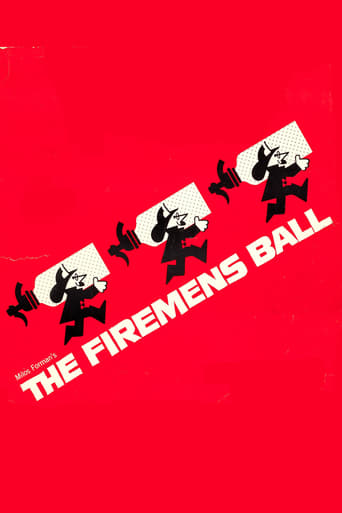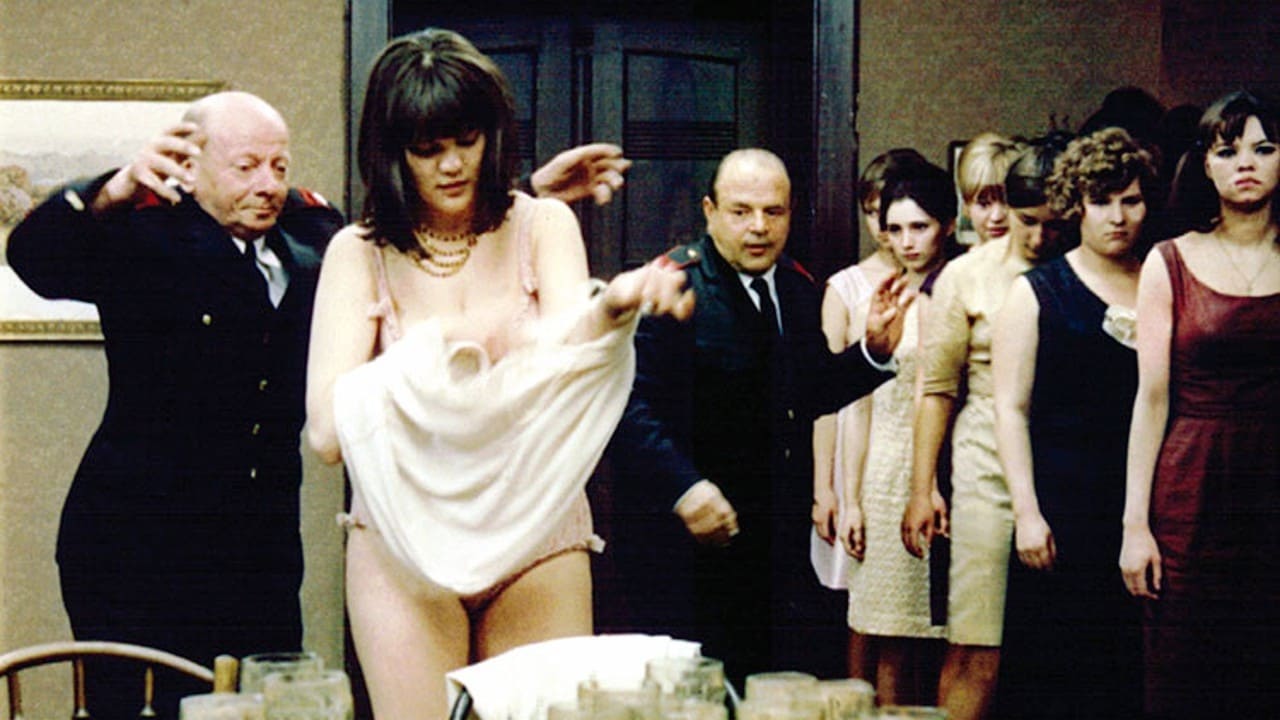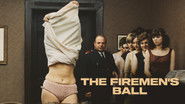gavin6942
The fire department in a small town is having a big party when the ex-boss of the department celebrates his 86th birthday. The whole town is invited but things don't go as planned. Someone is stealing the prizes to the lottery and the candidates for the Miss Fire-Department beauty contest are neither willing nor particularly beautiful.The film has widely been interpreted as a satire on the East European Communist system, and it was "banned forever" in Czechoslovakia following the Soviet invasion of 1968. Forman reflected that the film was not intended to be a satire of any particular government, saying, "I didn't want to give any special message or allegory. I wanted just to make a comedy knowing that if I'll be real, if I'll be true, the film will automatically reveal an allegorical sense. That's a problem of all governments, of all committees, including firemen's committees. That they try and they pretend and they announce that they are preparing a happy, gay, amusing evening or life for the people. And everybody has the best intentions... But suddenly things turn out in such a catastrophic way that, for me, this is a vision of what's going on today in the world." And he is right. This is not anti-Soviet or anti-Czech. It plays just as well in the United States as a satire on bureaucracy, or could be seen without any satire at all... why not just a group of bumbling men? When Abbott and Costello pretend to be something, is it an insult to that profession? Of course not.
Turfseer
Released three months before the Soviet crackdown on the progressive Dubček administration in Czechoslovakia, Milos Forman still had to deal with a negative reaction to 'The Fireman's Ball' from both Communist censors and his own producer, Carlo Ponti. Forman's farce was intended as a good-natured ribbing of the Communist system, specifically its corruption and bureaucratic ineptness. The censors and Ponti didn't like it because in their eyes, it had no sympathy for its working class subjects, who come across as complete fools.As the story goes, Communist officials decided to play the film in the small town where the film was shot, which featured locals playing themselves as members of the local fireman's committee. As things turned out, the officials were shocked when the townspeople vigorously applauded the film. They identified immediately with the broken down system, where a fire breaks out across the street, but the firefighters are unable to do anything, as their fire truck ends up stuck in the snow. As for their farcical characters, they regarded it as simply 'acting' and obviously were flattered to be chosen to be part of a professional film production. Forman was ultimately saved by French director Francois Traffaut, who ended up buying the film with some partners and distributing it outside of Czechoslovakia, where it was permanently banned after the Soviet invasion.As for the film itself, 'The Fireman's Ball', manages to be distinctive, mainly on the basis of the authenticity of its performers. You have to love the amateur cast Forman has assembled here, as they seem to have a natural flair for farce. Nonetheless, the basic theme of the film, the corruption inherent in the Communist system of that time, as evidenced by the constant thefts that occur during the event, go on ad infinitum. That's not to say there aren't occasional laughs. When the Chairman has the lights turned off, expecting the thief to return the lottery presents, when the lights do come back on, the opposite occurs: the rest of the gifts are all missing. The deepest laugh remains subtle: one of the firemen attempts to return a headcheese (cold cut) to the dining table, after he discovers his wife has pilfered it. Completely embarrassed, he passes out when everyone observes what he's trying to do and an argument ensues right afterward between two of his colleagues, one shouting down the other that by being 'honest', he's embarrassed the fire brigade. It seems that being honest, is much less desirable then looking out for one's own self-interest.The Fireman's Ball plot involves the fire committee's inept manner in which they attempt to choose a local beauty queen. The young women who are conscripted appear not to take the fire officials seriously, and end up running off to the ladies room, where they've made it clear that they have no intention of participating in the committee's ultimate goal (the idea is for the winner of the pageant to present a memento to their retiring chief). While it's one thing for the firemen to be overwhelmed in dealing with the 'larceny problem' at the ball, it's another to come off as completely ridiculous, which is what they appear to be, when they foolishly attempt to put the pageant together and then atrociously fail, with all the young women giggling, and running away from them. Perhaps this is why Mr. Ponti, the film's original producer, did not care for the film.Forman does well in breaking up the action at the ball, when he introduces the fire at the old man's house, near the dance hall. The event turns out to be bittersweet, as there's also some humor attached to the somber events. We see this when the crowd moves the old man closer to the fire, as he complains about being cold. And later when they want to give him some lottery tickets, he asks for money instead, as it's obvious all the prizes now have been stolen.'The Fireman's Ball' ends on two additional humorous notes. First, the chief finally receives his honorarium from his colleagues--but of course it turns out to be stolen. And the old man whose house has burned down, joins another old man in his bed, without a roof over it!Forman's talent here was in getting much out of his amateur cast as well as stretching out a one joke idea, to a full length feature. He makes his point about corruption in Communist society well, in a series of memorable scenes but is less successful, as he dumbs down his firemen committee members, a tad bit too much. 'The Fireman's Ball' is more important in the overall history of international cinema and world history, than as a critical contribution to the art of comic screen writing.
Jackson Booth-Millard
From director Milos Forman (One Flew over the Cuckoo's Nest, Amadeus, Man on the Moon), this film was highly recommended to me by the book 1001 Movies You Must See Before You Die, and being admirable about the director I was interested to see a film in his native Czechoslovakian language, the last before going to America. Basically in a small Czechoslovak town the volunteer fire department are organising a ball in the town hall, with a lottery and a beauty contest included, this is also to celebrate the birthday of the honorary chairman who has cancer, but they don't know if he knows that, and they will present him with a small ceremonial fire axe. As the ball gets underway the fire-fighter committee members have not done the best planning for the beauty contest, so they have quickly got together eight candidates to compete for the prize, it is only after they have been drinking too much alcohol that one of the fathers gets them to accept his obese daughter. The lottery of the ball also suffers problems when food and drink as prizes start disappearing from the table, fire-fighter Josef (Josef Kolb), unaware that his wife is one of those stealing, tries to get the stolen prizes back, without success. Eventually enough women have been found to compete in the beauty contest, and the winner they are told will present the gift to the honorary chairman, but the women all lock themselves in the bathroom and refuse to take part, so the committee are forces to find another bunch of candidates to put on stage. Soon though everyone is running out of the hall, drinks consumed being unpaid for, because the siren sounds because the house of an Old Man (Frantisek Svet) is on fire, but snow is causing the fire engine to get stuck, so they are unable to put out the fire, only to save furniture from the house. The fire fighters decide to help the old man by letting him get all the prizes in the lottery, but almost all of them, besides the smaller and less valuable ones, have been stolen, everyone is told to bring back whatever they have taken, but in a moment of darkness the rest are taken also. So that their reputation will be saved the fire committee members move back stage to discuss the situation at the ball, but they return to see everyone has gone, apart from the honorary chairman, and when they want to give him the axe in the gift box this has been stolen as well. Also starring Jan Vostrcil as Head of Committee, Frantisek Debelka as Committee Member #1, Josef Sebánek as Committee Member #2, Josef Valnoha as Committee Member #3, Josef Rehorek as Committee Member #4, Vratislav Cermák as Committee Member #5, Václav Novotný as Committee Member #6, Frantisek Reinstein as Committee Member #7, Frantisek Paska as Committee Member #8, Ladislav Adam as Committee Member #9, Jan Stöckl as Retired Fire Chief, Stanislav Holubec as Karel and Josef Kutálek as Ludva. You do not need to have knowledge of Czech politics to enjoy most of this film, it portrays the time setting of the 1950's pretty well, it mocks the incompetence and lack of manners of the characters, the comedy parts mostly come from the moments of idiocy as a celebratory event goes wrong, it is a likable political satire. Very good!
bure998
i really enjoyed the first 3/4ths of this movie. it was quaint, cute, clever and a bit off-the-wall, with likable characters and a simple but funny plot line. the scenes with the beauty show contestants and how they reacted to what was going on were priceless! without giving too much away, a fire occurs nearby while the party is going on, the whole town goes to help, and the happy, fun feel of the movie turns to depressing. the very last scene is especially heartbreaking concerning the 86-year-old former administrator. maybe my take on the first part of the movie is a bit pie-in-the-sky, but i wish the movie could have kept the silly, sweet, happy, small-town feel all the way through.


 AD
AD






